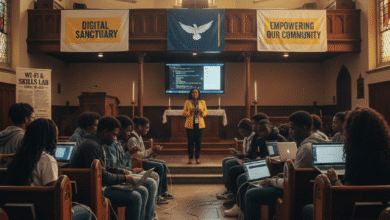
In just a few years, Artificial Intelligence (AI) has evolved from a distant curiosity to a core driver of business, communication, and personal productivity. At the center of this shift are Large Language Models (LLMs) like ChatGPT, which are now capable of not only understanding human language, but generating ideas, executing tasks, and powering intelligent agents across industries. This is no longer the future — it’s the now. And it’s redefining how we work, live, and lead, even at the local level in places like Northern New Jersey.
What Are LLMs and What’s New in 2025?
Large Language Models are trained on massive amounts of text to predict and generate coherent language outputs. The latest versions — including OpenAI’s GPT-4 and GPT-4o, Anthropic’s Claude 3, Meta’s LLaMA 3, and Google’s Gemini 1.5 — mark a significant leap forward in terms of:
- Multimodal capabilities: These models can process and respond to text, images, audio, and even video prompts.
- Longer context windows: GPT-4o, for instance, can now handle over 100,000 words at once, making it ideal for analyzing full documents or books.
- Real-time conversation: With improved latency and memory, LLMs can now hold deeper, more continuous conversations, allowing users to build persistent workflows with AI agents that remember preferences and past work.
- Tool integration: Modern LLMs can connect with third-party tools (email, calendars, spreadsheets, APIs), transforming them into true virtual co-workers rather than glorified search engines.
Defining Automated Workflows and AI Agents
Automated workflows refer to pre-programmed sequences that trigger actions across apps and systems — for example, automatically moving new form submissions into a spreadsheet, sending a confirmation email, and updating a project board. They save time by handling repetitive tasks without human intervention.
are intelligent digital assistants powered by Large Language Models (LLMs) and other machine learning technologies. Unlike traditional chatbots or static workflows, AI agents can autonomously interpret tasks, make decisions, and take action on behalf of users. They learn from feedback, adapt over time, and carry context between tasks.
AI agents, on the other hand, are intelligent systems powered by LLMs that not only follow instructions but also make contextual decisions, learn from past interactions, and adapt based on user goals. For example, a workflow might auto-send a report every Monday, but an AI agent could generate that report, analyze trends from the week, summarize key risks, and adjust the content depending on your role.
In short, workflows do what they’re told — AI agents decide what’s relevant.
How AI Like ChatGPT Is Changing the Way We Work
With models like ChatGPT now embedded in Microsoft Office, Google Workspace, Slack, and countless apps, AI is no longer just a research tool — it’s a new kind of collaborator.
Key shifts include:
- Knowledge Work Acceleration: AI summarizes meetings, writes reports, drafts emails, and even codes apps.
- Decision Support: LLMs assist executives by aggregating insights, modeling business outcomes, and simulating conversations.
- Process Automation: Paired with automation tools like Zapier or Make.com, AI can now act as a central brain coordinating dozens of apps in real time.
- 24/7 Customer Interaction: AI chatbots now power entire sales funnels, help desks, and onboarding processes with near-human fluency.
According to McKinsey (2025), over 65% of white-collar professionals in the U.S. now use AI daily, and AI-driven productivity tools have led to a 12–20% increase in measurable output.
How AI Could Impact Northern New Jersey Industries
Northern New Jersey is a vibrant, urban-suburban corridor with strong roots in logistics, healthcare, finance, retail, education, and local government — all of which are ripe for AI transformation.
| Sector | AI Impact Potential |
| Healthcare | AI agents can automate patient intake, write clinical notes, transcribe consultations, and summarize insurance claims. |
| Logistics & Transport | Predictive AI models help optimize delivery routes, manage inventory, and improve fuel efficiency. |
| Finance & Banking | AI-powered agents handle fraud detection, customer support, loan modeling, and risk forecasting. |
| Education | ChatGPT-style tutors offer personalized learning, grading support, and curriculum planning for local schools. |
| Retail & Small Business | AI streamlines marketing, auto-generates product descriptions, manages customer service, and forecasts demand. |
| Government & Civic Services | Local governments can use AI to summarize policies, automate public service responses, and enhance transparency. |
Imagine a city council office in Newark using an AI assistant to summarize zoning proposals or a small logistics firm in Union County using LLMs to optimize warehouse operations.
How the Regular Person Can Start Using ChatGPT Today
You don’t need to be a tech expert to benefit from AI. You just need a browser or a smartphone.
Here are three real-life use cases with simple outcomes:
1. Family Budget Planning
- Prompt: “Help me build a monthly family budget for a household of 4 living in Jersey City with $6,000 income.”
- Outcome: ChatGPT can generate a breakdown of spending, suggest cost-saving opportunities, and even connect to Google Sheets to track it monthly.
2. Job Hunting & Resume Building
- Prompt: “Rewrite my resume to fit a customer service job at Prudential in Newark. Here’s my experience…”
- Outcome: AI generates tailored resumes and cover letters in seconds — no expensive resume service needed.
3. Community Advocacy
- Prompt: “Write a compelling letter to my city councilmember about sidewalk repairs in East Orange.”
- Outcome: ChatGPT drafts a clear, passionate, fact-based letter you can print, email, or submit online.
These are just a fraction of what’s possible. From birthday planning to legal research, meal prep to business idea validation — AI is now a Swiss Army knife for your daily life.
As artificial intelligence continues to evolve at breakneck speed, two innovations are shaping the next wave of transformation: AI Agents and Automated Workflows. No longer just buzzwords, these technologies are now embedded in productivity tools, business systems, customer experiences — and soon, nearly every corner of our personal lives.
Recent Advancements in AI Agent Technology
Since the release of OpenAI’s GPT-4o and Anthropic’s Claude 3, AI agents have grown exponentially more capable. According to Demis Hassabis, CEO of Google DeepMind: “The future of AI lies in systems that don’t just generate responses — but act, think, and learn in service of human goals.”
OpenAI CTO Mira Murati echoed this vision in a recent talk, stating, “We’re moving toward AI that collaborates with you — not just answers your questions, but works alongside you to complete complex tasks.”
Where This Is Headed: The Future of Intelligent Automation
Over the next 3–5 years, AI agents and automated workflows will touch nearly every aspect of personal and professional life. Key trajectories include:
1. Personal Productivity Becomes Proactive
- AI agents will manage your inbox, summarize your news, update your calendar, and send birthday reminders without prompts.
- They’ll coordinate with other agents (e.g., your partner’s or employer’s) to optimize schedules and reduce decision fatigue.
2. The End of Busywork in Knowledge Professions
- Lawyers will use agents to draft contracts and conduct legal research.
- Marketers will automate campaign builds, content creation, and audience testing.
- Financial planners will employ agents to monitor portfolio shifts and regulatory changes.
3. Revolutionizing Customer Service and Retail
- AI agents will personalize customer service by referencing past behavior, preferences, and product history.
- In e-commerce, agents will assist shoppers by recommending products, comparing prices, and scheduling deliveries — all in natural conversation.
4. Healthcare Support in Real-Time
- Medical AI agents will transcribe and summarize doctor-patient visits, flag urgent symptoms, and even initiate billing paperwork.
- For patients, personal health agents will track medication, interpret lab results, and sync with wearable devices.
5. Education and Personal Learning
- Personalized AI tutors will adapt to student learning styles, flag areas of struggle, and provide tailored lesson plans.
- Educators will use workflow automation to grade papers, plan curricula, and send parent updates.
Challenges and Ethical Considerations
As these technologies become more powerful, we must grapple with issues like:
- Data privacy and misuse
- Job displacement and skills gaps
- Transparency and explainability of decisions
AI thought leader Fei-Fei Li, professor at Stanford University, warns: “We cannot build intelligence without building ethics. Human-centered design must remain at the core of AI advancement.”
What You Can Do Today
- Use ChatGPT, Claude, or Microsoft Copilot to experiment with personal agents.
- Explore tools like Zapier, IFTTT, or Make to start building simple workflows.
- Watch for new features inside platforms you already use — many productivity tools are integrating agents quietly.
- Stay informed and practice responsible experimentation.
Final Word: Agents That Work With You
AI agents and automated workflows won’t just change how we work — they’ll change how we think about work. They’ll move from being tools to being teammates. For individuals, small businesses, and large enterprises alike, this transformation offers an unprecedented chance to reclaim time, reduce complexity, and reimagine what’s possible.
Don’t Get Left Behind
AI isn’t coming — it’s already here. The real question is whether we’ll use it passively as consumers or actively as creators and shapers of a more efficient, inclusive, and imaginative future.
At HfYC, we believe in democratizing these tools — making sure everyday people from Newark to Paterson to Union have access, understanding, and support as AI reshapes our communities.
The question isn’t whether you’ll use an AI agent. It’s how early you’ll start, and how thoughtfully you’ll shape the relationship.






2 Comments